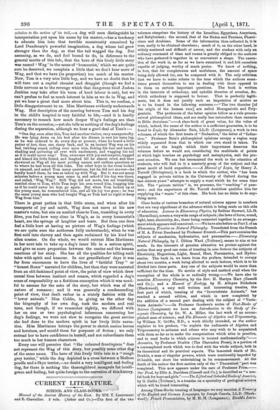Class books of various branches of natural science appear in
numbers that are very significant of the advance which is being made on this side of education. Lessons in Elementary Physics, by Balfour Stewart, LL.D. (Macmillan), covers a verywide range of subjects ; the laws of force, sound, light, heat, electricity, &c., these being connected together in an arrange- ment which appears well conceived.—We have also before us Part I. of an Elementary Treatise on Natural Philosophy. Translated from the French of M. A. Privet Deschanel by Professor Everett.—This part contains the subjects of mechanics, hydrostatics, and pneumatics.--Elementary Natural Philosophy, by J. Clifton Ward (Triibner), seems to aim at too much. In the interests of genuine education we protest against the notion that any good can come of treating in nine lectures the subjects of Electricity, Magnetism, Light, Sound, Heat, Pneumatics, and Hydro- statics. The book is, we learn from the preface, intended to occupy about two months, a week being allotted to each lecture, which is to be divided into three parts. Any one of the subjects would be more than sufficient for the time. No merits of style and method avail when the conception of the whole is so radically wrong.—We have also to mention Elementary Chemistry, by the Rev. H. Martyn Hart (Cassell and Co.); and a Manual of Zoology, by H. Alleyne Nicholson (Blackwood), a very well written and interesting treatise, the first part of which, treating of the "Invertebrate Animals," has reached a second edition, and which is now completed by the addition of a second part dealing with the subject of "Verte- brate Animals."—In Professor Goodeve's series of Text-Books of Science (Longmans) we have an _Introduction to the Study of in- organic Chemistry, by Dr. W. A. Miller, the last work of an accom- plished man of science ; and The Elements of Algebra and Trigonometry, by William N. Griffin, B.D., a work chiefly intended, as the author explains in his preface, "to explain the rudiments of Algebra and Trigonometry to artizans and others who may wish to be acquainted with them so far as to make the computations which arise in practice, and to road books in which science is treated mathematically ."— Acoustics, by Professor Donkin (The Clarendon Press), is a portion of a contemplated work which was to deal with the whole subject, both in its theoretical and its practical aspects. The lamented death of Mr.. Donkin, a man of singular powers, which were continually impeded by ill-health, cut short the undertaking in its commencement. At the death of the author the first section only of the " Theoretical "part was completed. This now appears under the care of Professor Price.— Our Food, by Ellis A. Davidson (Cassell and Co.), is described as "a use- ful book for boys and girls."—The Lifted and Subsided Rocks of America, by G. Catlin (Triilmer), is a treatise on a speciality of geological science which will be found interesting.
































 Previous page
Previous page